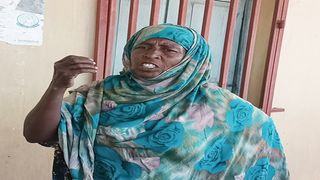
Khadija Sugow, a midwife in Haroresa village during an Interview with the nation.africa in Haroresa Village, Tana River County.
| Stephen Oduor I Nation Media Group.Tana River
Premium
In forgotten Tana village, women deliver in bush with grave risks
Pregnant women in Haroresa village, Tana River County, deliver not in hospitals with modern maternity services but in the bush.
Incessant lobbying of the county government for the past four years has yielded nothing, so expectant women find a spot in the wild and give birth to their babies on pieces of cloth with the help of midwives.
The chosen area is first cleared of brush to leave the ground bare. The women then make a temporary circular makeshift shelter with sticks and leaves.
“It must be far from the village because the women’s screams must not be heard by men and elders, as the culture dictates,” says traditional midwife Fatuma Ibrahim.
An animal hide and pieces of wrapper (lesso) are spread on the ground.
Four women are allowed in the structure while the rest stay outside to help with other duties.
The result is a matter of sheer luck, as life is not guaranteed. Some deliveries are successful, others are not and in the worst circumstances, both mother and infant die.
Khadija Sugow, a midwife in Haroresa village, notes that among five women that she helps with deliveries in a year, two infants die and if they survive, the mothers do not.
“Sometimes I have to choose between saving the infant or the mother. Most times, we choose to save the mother so that she lives to fight another day,” she says.
Though they have a dispensary built in 2013, it does not have a maternity section and its medical practitioner does not live in the area and cannot be easily reached when an emergency occurs.
The area has no operational mobile network and locals cannot ask for an ambulance when they need one.
A person with an emergency must find a motorbike and travel 20km to a spot where the phone can pick up a network to make a call.
Since 2014, the county administration has not paid any attention to the road that leads to the village. It is in a bad state and impassable by car in the rainy season.
“Even when it is not raining, an ambulance cannot make it through with a patient. The road is too bad for an emergency drive,” says Osman Mohammed, a youth leader in Haroresa.
Residents feel neglected and have resorted to finding traditional means of surviving.
The only authority they can take their grievances to is the area chief, who offers little, if anything.
“We are never consulted for our views on anything and yet we are just 38km from the headquarters. Even when we send young people and elders to represent us in the town, our views are never taken into account,” Mr Mohammed says.

Dakane Bosh, an elder during an interview with the nation.africa in Haroresa village, Tana River County.
Elder Dakane Bosh notes that the county administration had marginalised the sub-location, leaving them hopeless.
Village elders, he said, had requested an audience with county officials several times without success.
“We have tried to appeal to the county administration and sought a meeting with the governor for the last four years all in vain,” he says.
Having explored all practical options, Mr Bosh and others in the village now only hold prayers of hope.
Nation.Africa reached out to area MCA Sammy Malibe for comment but he was not available by phone.
Tana River Health executive Javan Bonaya declined to respond to the issues raised by villagers about lack of maternity services in the area.





